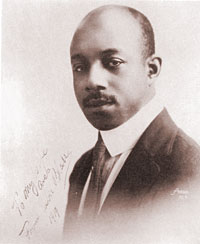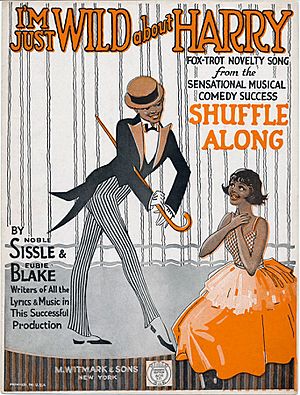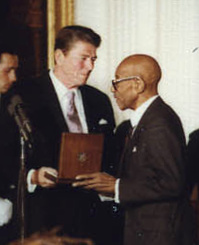Eubie Blake facts for kids
Quick facts for kids
Eubie Blake
|
|
|---|---|
 |
|
| Background information | |
| Birth name | James Hubert Blake |
| Born | February 7, 1887 Baltimore, Maryland, U.S. |
| Died | February 12, 1983 (aged 96) Brooklyn, New York, U.S. |
| Genres | Jazz, popular, ragtime |
| Occupation(s) | Composer, musician |
| Instruments | Piano |
| Labels | Emerson, Victor |
| Associated acts | Noble Sissle |
James Hubert "Eubie" Blake (born February 7, 1887 – died February 12, 1983) was an American musician. He was a talented pianist and a composer of ragtime, jazz, and popular music.
In 1921, Eubie Blake and his friend Noble Sissle created Shuffle Along. This was a very important Broadway musical because it was one of the first to be written and directed by African Americans. Blake wrote many famous songs, including "Bandana Days", "Charleston Rag", "Love Will Find a Way", "Memories of You", and "I'm Just Wild About Harry".
His music was celebrated in the 1978 Broadway show Eubie!. In 1981, President Ronald Reagan honored Blake with the Presidential Medal of Freedom. This is one of the highest awards a civilian can receive in the United States.
Contents
Early Life and Musical Beginnings
Eubie Blake was born in Baltimore, Maryland. He was the only one of his parents' many children to survive past childhood. His parents, Emily "Emma" Johnstone and John Sumner Blake, had both been enslaved before he was born. His father worked on the Baltimore Docks.
Blake often said he was born in 1883. However, official records like the U.S. Census and Social Security papers show his birth year as 1887.
Blake's musical journey started very early, when he was only four or five years old. One day, while shopping with his mother, he wandered into a music store. He climbed onto an organ bench and began playing around. The store manager was amazed and told his mother that Eubie was a genius. The Blake family bought a pump organ for $75, paying 25 cents each week.
When he was seven, Eubie took music lessons from a neighbor, Margaret Marshall. She was an organist at a Methodist church.
Becoming a Professional Musician

Eubie Blake got his first big chance in music in 1907. World champion boxer Joe Gans hired him to play piano at Gans's Goldfield Hotel. This was a special place in Baltimore called a "black and tan club". It was one of the first clubs where both Black and white people could enjoy entertainment together. Blake played there during the winters from 1907 to 1914. In the summers, he performed in clubs in Atlantic City. During this time, he also studied music composition in Baltimore.
Blake also shared stories about working with a traveling medicine show. He would play a melodeon that was strapped to the back of the wagon. However, he only stayed with the show for two weeks.
Blake said he created the tune for "Charleston Rag" in 1899, when he was just 12 years old. But he didn't write it down as musical notes until 1915. That's when he learned how to write music properly.
In 1912, Blake started performing in vaudeville shows. He played with James Reese Europe's Society Orchestra. This band played ragtime music, which was very popular back then.
After World War I, Blake formed a musical act called the Dixie Duo with Noble Sissle. They later started working on a musical show called Shuffle Along. This show included songs they had written. When Shuffle Along opened in June 1921, it became a huge success on Broadway. It was the first hit musical written by and about African Americans. It also introduced famous songs like "I'm Just Wild About Harry" and "Love Will Find a Way". The show was so popular that it ran for 504 performances and toured nationally for three years.
Blake made his first recordings in 1917. He recorded for the Pathé record label and for piano rolls. In the 1920s, he continued to record for labels like Victor and Emerson.
In 1923, Blake appeared in three short films. These films used a new technology called Phonofilm, which recorded sound directly onto the film. Blake also appeared in the 1932 short film Pie, Pie Blackbird with the Nicholas Brothers. That same year, he and his orchestra provided most of the music for the film Harlem Is Heaven.
Later Life and Achievements
In 1910, Eubie Blake married Avis Elizabeth Cecelia Lee. They had known each other since they were children in Baltimore. Blake brought his new wife to Atlantic City, New Jersey, where he was working at a nightclub.
Sadly, Avis became ill with tuberculosis and passed away in 1938 at age 58. Blake was very sad about losing her.
During World War II, Blake led a band for the USO. This organization provided entertainment to American troops. While working with the USO, he met Marion Grant Tyler. They married in 1945. Marion was a performer and a smart businesswoman. She became his important business manager until she passed away in 1982.
In 1946, Blake stopped performing for a while. He went to New York University to study music composition. He graduated in two and a half years. For the next two decades, he worked on writing down songs he had memorized but never formally put on paper.
In the 1970s and 1980s, people became very interested in Blake's music again. This happened after he released his 1969 album, The Eighty-Six Years of Eubie Blake.
Blake was a frequent guest on popular TV shows like The Tonight Show Starring Johnny Carson and Merv Griffin. Famous conductors like Leonard Bernstein and Arthur Fiedler featured his music. In 1977, he acted in the film Scott Joplin. By 1975, he had received many honorary doctorates from universities. On October 9, 1981, he received the Presidential Medal of Freedom from President Ronald Reagan.
The musical Eubie!, which featured Blake's music, opened on Broadway in 1978. It was a big hit and ran for 439 performances. It was even nominated for three Tony Awards, including one for Blake's music. The show was filmed in 1981 with its original cast.
Blake also performed with dancer Gregory Hines on the TV show Saturday Night Live on March 10, 1979.
Death and Legacy
Eubie Blake continued to play and record music until he passed away on February 12, 1983, in Brooklyn. This was five days after events celebrating what was thought to be his 100th birthday. However, it was actually his 96th birthday.
He was buried in Cypress Hills Cemetery in Brooklyn, New York. His headstone has the musical notes of "I'm Just Wild About Harry" carved into it. A bronze sculpture of Blake's face was created by David Byer-Tyre.
Blake is famously quoted as saying on his birthday in 1979, "If I'd known I was going to live this long, I would have taken better care of myself."
Awards and Recognition
Eubie Blake received many honors throughout his long life:
- 1969: Nominated for a Grammy Award for his album The Eighty-Six Years of Eubie Blake.
- 1974: Received a Doctor of Fine Arts degree from Rutgers University.
- 1974: Received a Doctor of Humane Letters degree from Dartmouth College.
- 1978: Received a Doctor of Fine Arts degree from the University of Maryland.
- 1979: Received a Doctor of Music degree from Morgan State University.
- 1980: Awarded the George Peabody Medal from Johns Hopkins University.
- 1981: Received the Presidential Medal of Freedom from President Ronald Reagan.
- 1982: Received a Doctor of Music degree from Howard University.
- 1995: The United States Postal Service issued a postage stamp in his honor.
- 1995: Inducted into the American Theatre Hall of Fame in New York City.
- 1998: James Hubert Blake High School in Maryland was named after him.
- 2006: His 1969 album The Eighty-Six Years of Eubie Blake was added to the Library of Congress' National Recording Registry. This registry includes songs that are important for cultural, historical, or artistic reasons.
See also
 In Spanish: Eubie Blake para niños
In Spanish: Eubie Blake para niños
- African American musical theater
- List of ragtime composers
 | James Van Der Zee |
 | Alma Thomas |
 | Ellis Wilson |
 | Margaret Taylor-Burroughs |


